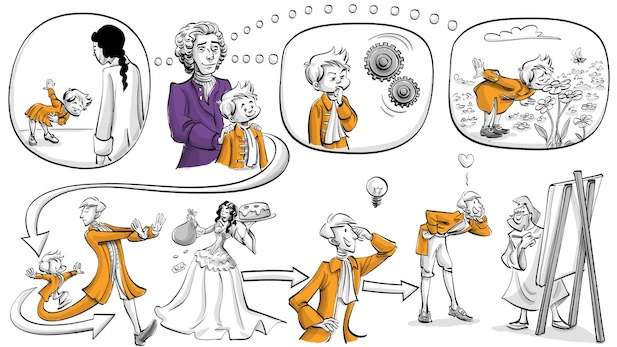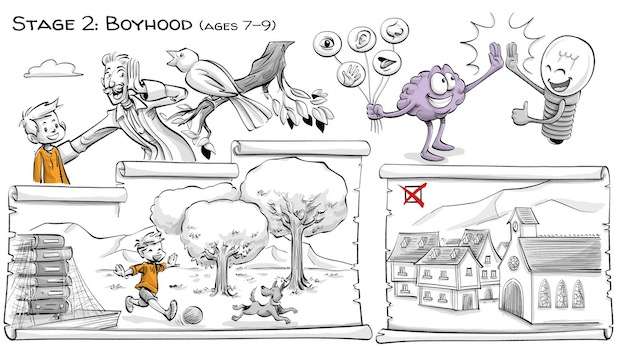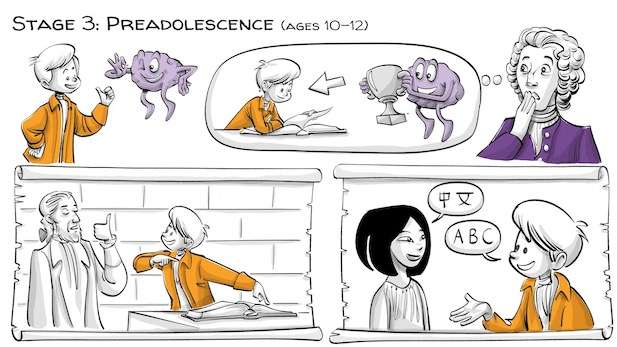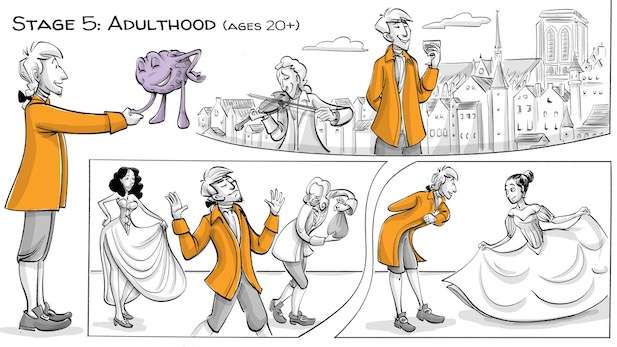Rousseau’s philosophy of education is based on the idea that children should develop a strong, virtuous character, the ability to reason and a refined sense of sentiment.To explain his ideas, Rousseau wrote “Emile, or On Education”. The book tells the story of a boy, who goes through childhood, boyhood, preadolescence, adolescence and adulthood.
the full story

Jean-Jacques Rousseau’s philosophy of education is based on the idea that children should develop a strong, virtuous character, the ability to reason, and a refined sense of sentiment. This is so that, as adults, they are able to resist temptations, think for themselves, and learn to appreciate the finer things in life.
To explain his ideas, Rousseau wrote “Emile, or On Education”. The book tells the story of a boy, who goes through childhood, boyhood, preadolescence, adolescence and adulthood. All five stages happen under the guardianship of his parents and a tutor.
stage 1: early childhood

Stage 1, early childhood, begins with Émile’s birth. During this stage, it is essential for his parents to ensure that Émile develops physically. Only the mother should feed the boy, because she naturally loves him more than anyone else. To allow the boy to make experiences with all his senses, he wears loose clothing and is placed in a large cradle where he can move freely. Rousseau, who was influenced by John Locke, believed that dressing children too warmly makes them weak.
If Emile doesn’t want to eat, he’s supported. If he wants to use his left hand, he can. Beating or shouting at the boy should be avoided. When Emile “cries”, which Rousseau called our first language, his mother should try to understand him and find the underlying cause. Since children are born essentially good, it is the responsibility of the parents to shield them from those who could influence their innocent minds.
stage 2: boyhood

During Stage 2, Boyhood, Emile is educated to perfect his senses. This is important because the mind needs a wide range of trained senses to perceive information correctly and develop good judgment. Instead of recommending books, the tutor lets Emile play games and conduct natural experiments outside. The city or a school are not the right places for a child at this age.
Emile learns to tell right from wrong by experiencing the consequences of his actions. Instead of actively teaching, the tutor is merely a bystander who is there to protect the boy from those who want to influence his thinking or teach him bad habits. Over time Emile learns morality and virtue naturally.
stage 3: preadolescence

In Stage 3, Preadolescence, Emile is ready to learn how to reason. Rousseau thought that only self-directed learning led to the discipline necessary to acquire real knowledge. The tutor therefore trusts Emile’s interests and if the boy wants to learn history, history he learns. Languages are acquired naturally through conversations.
Emile is also taught carpentry, a manual labor that requires creativity and intellect, which helps him to become a virtuous adult who knows the value of hard work. Doing such work also keeps Emile out of trouble, and allows him to make a living in the event of a change in fortune.
stage 4: Adolescence

In Stage IV, Adolescence, Emile is ready for the last part of his education — sentiment. Only now is he capable of understanding complex emotions such as true compassion. Emile now becomes a loving person who learns to live with, and for others. Or as Rousseau wrote “We have made an active and thinking being. It remains for us, in order to complete the man, only to make a loving and feeling being—that is to say, to perfect reason by sentiment”
The tutor now begins formal education and introduces the passionate boy to concepts such as religion. Children who learn such complex ideas earlier, are unable to think about them freely and hence just recite what they have been told. Emile, whose character has grown strong enough to reason, is now permitted to mingle with people in society.
stage 5: adulthood

In Stage V, Adulthood, Emile becomes a virtuous man, who can make up his own mind. He visits the city and develops a sense for the finer things in life. Thanks to his strong character, the pursuit of wealth or other temptations are none of his interest. The young man is now ready to meet Sophie — the perfect woman, his wife-to-be.
Sophie, a representative of the ideal woman, is educated to be governed by her husband while Émile, a representative of the ideal man, is educated to be self-governing. “The man should be strong and active; the woman should be weak and passive”’, Rousseau wrote. Sophie’s purpose is to please, advise and console her husband.
Public opinion on Rousseau’s book

Once published, Rousseau’s books were widely criticized, burned, and banned. The Church and state issued a warrant for Rousseau’s arrest. In addition, modern women disagreed with his ideas or saw in him a hypocrite: Rousseau himself sent away all five of his children to orphanages. Nevertheless, “Emile” became Rousseau’s most important work and a pillar of modern education.
what do you think?

But what are your thoughts? Do you think Emile receives the ideal education to become a truly free thinking mind? Is it right to try to protect children from society’s influence? Or was Rousseau wrong about education? Tell us what you think in the comments below.
Sources
- Doyle, M. E., & Smith, M. K. (2007-2013). Jean-Jacques Rousseau on nature, wholeness and education. www.Infed.org. Last update: January 07, 2013
- Rawat, K. (2008, August 20). Rousseau. Educational philosophy. http://pakphilosophy.blogspot.com
- Emile, or On Education – Wikipedia.org
- Noble savage – Wikipedia.org
- Jean-Jacques Rousseau – Wikipedia.org
- Social contract – Wikipedia.org
- Rawat, K. (2014, March 19). Rousseau: Summary of Emile Book 1. http://pakphilosophy.blogspot.com
- Roopnarine, J. L., & Johnson, J. E. (Eds. ). (1987). Approaches to early childhood education. New York: Merrill.
Dig deeper!
- Read Rousseau’s original work “Emile, or on Education”
- Read about Child Development, History of the Concept – brief overview of opinions about child development
- Watch our video on Piaget’s theory on cognitive development
- Watch our video on the 8 stages of development by Erikson
Collaborators
- Script: Jonas Koblin
- Artist: Pascal Gaggelli
- Voice: Mithrilda
- Coloring: Nalin
- Editing: Peera Lertsukittipongsa
- Sound Design: Miguel Ojeda
- Production: Selina Bador
- Fact Checking: Ludovico Saint Amour di Chanaz
